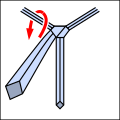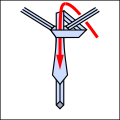Pratt knot

The Pratt knot is a method of tying a necktie. It is also known as the Shelby knot.[1][2][3] The knot was created by Jerry Pratt, an employee of the US Chamber of Commerce in the late 1950s.[4] It was popularized as the Shelby knot after then 92-year-old Pratt taught it in 1986 to television reporter Don Shelby who he felt had been tying his tie poorly on the air.[5] Shelby then refined the Pratt knot with local clothier Kingford Bavender and wore it on the air with a spread collar where it stood out and attracted attention for its symmetry and trim precision.[6]
The knot is a variation on the Nicky knot. Both the Pratt and Nicky knots are tied inside out, though only the Nicky knot is self-releasing. Before its popularization in a 1989 New York Times article, the knot was unknown within the fashion world and not recorded in the tie industry's standard reference guide of the time, Getting Knotted – 188 Knots for Necks by Davide Mosconi and Riccardo Villarosa in Milan, Italy.[6][7]
The Pratt knot uses less length than the half-Windsor or Windsor knots, and so is well suited to shorter ties or taller men. Unlike the four-in-hand knot, the Pratt method produces a symmetrical knot. It is of medium thickness.
Using notation from and according to The 85 Ways to Tie a Tie, the knot is tied
- Lo Ci Lo Ri Co T (knot 5).
See also
[edit]References
[edit]- ^ "Don Shelby inspires new 'ShelbyKnot' tie collection – Twin Cities".
- ^ ""Don Shelby" tie knot – Google Search".
- ^ "Don Shelby Partners with St. Paul Clothier for Necktie Line".
- ^ "As Neckwear Goes, This Knot's News". NYTimes. Retrieved 20 August 2018.
- ^ "Taking a Tip from a Dapper Fan, Anchorman Don Shelby Makes News with the Knot in His Necktie : People.com".
- ^ a b "As Neckwear Goes, This Knot's News". The New York Times. 30 August 1989.
- ^ Getting Knotted: 188 Knots for Necks : the History, Techniques and Photographs. Ratti. 1 January 1985.




